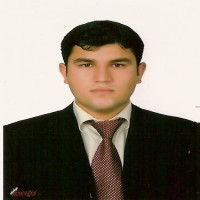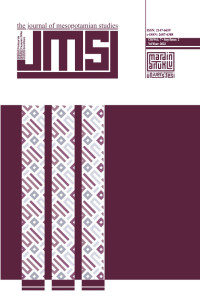Research Article
Issue Editorial Board
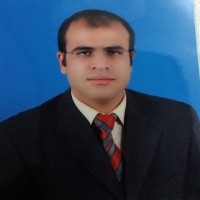
Assoc. Prof. Dr., Mardin Artuklu University, Kurdish Language and Culture Department
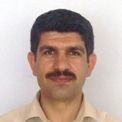
Doç. Dr.

Ph.D, Mardin Artuklu University Kurdish Language and Culture Department
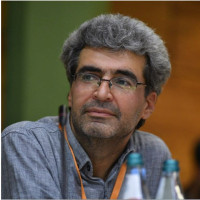
Dr.
Aim & Scope
The Journal of Mesopotamian Studies is a publication of The Institute of Living Language of Mardin Artuklu University. The Journal Mesopotamian Studies is an international peer-reviewed journal published semi-annually (Spring-Autumn). The aim of the journal is to publish scientific researches on Kurdish, Arabic and Syriac culture, language, literature, history, sociology, anthropology, philosophy and education which written in Turkish, Kurdish, English, Arabic and Syriac languages.
The Journal of Mesopotamian Studies is a publication of The Institute of Living Language of Mardin Artuklu University. The Journal of Mesopotamian Studies is an international peer-reviewed journal published semi-annually (Summer-Winter). Scientific researches on Kurdish, Arabic and Syriac culture, language, literature, history, sociology, anthropology, philosophy and education which written in Turkish, Kurdish, English, Arabic and Syriac languages are published in The Journal of Mesopotamian Studies.
Author Guidelines
JMS
The Journal of Mesopotamian Studies
PUBLICATION PRINCIPLES
The Journal of Mesopotamia Studies (JMS) is publication of The Institute of Living Language of Mardin Artuklu University. The JMS is a peer-reviewed journal which gives places to scientific researches on Kurdish, Arabic and Syriac culture, language and literature. It is published semi-annually (Winter and Summer Issues). The articles to be published should bear criteria of scientific researches, be innovative, and also should not be published anywhere else before. If an article has been presented in a scientific meeting, it will be accepted on the condition that it has not been published anywhere before.
The Evaluation of Articles
· Articles submitted for publication are firstly examined by editorial board in accordance with the publication principles of the journal. The endorsed ones are sent to two reviewers. The authors corrected the article according to the notes by reviewers; however they have right to object to the points where they do not agree with.
· Articles submitted for publication are sent to two experts of the field via methed of “blind review” afte they examined by Editorial Board. In the case of split in opinon of these two reviewers, the the article is sent to another reviewer. The article is published if at least two reviewers express positive opinion. The reports by reviewers are sent to the authors to pronounce the evaluation result.
· If one or both reviewers express “it could be published after certain revisions”, the article is sent to the author for the required revisions. After revisions are done, they are checked by reviewers or the Editorial Board to evaluate whether they are done in accordance with the remarks. Besides, the authors have right to object to the reviewers opinions. The objections are evaluated and resulted by the editorial board.
· The articles that decided to be published are sent to the author in PDF formatted after page adjustment. The author makes the last reading and shows necessary revisions on the text and sent it back.
· The unpublished articles are not return back to the rightful owner, furthermore the authors are responsible for the opinions of the articles.
· The journal does not demand any fees to publish their articles, and likewise does not pay any fees for publishing articles.
· The Editorial Board may make small adjustments those are not on the main stage.
· It is accepted that the copyright of the published articles are transferred to The Institute of Living Language of Mardin Artuklu University. This transfer includes virtual platforms.
· Article submission and evaluation process is conducted on Dergipark system.
· Before Evaluation process starts, the articles are analyzed via iThentica plagiarism program.
Language(s)of Publication
· The JMS gives places to articles in Turkish, Kurdish, Arabic, English and Syriac. However, it accepted as a principle that at least half of the studies in the journal should be in Kurdish and its various dialects. The articles sent to the journal must be free from all kinds of defects related to the use of academic language.
Writing Rules and Page Layout
· The articles must be written on MS Word or compatiple programs. Times New Roman should be used as typeface. The articles should be written in 12 font size in 1.5 ink line spacing and the pages should bear numbers. The articles should be maximum 9.000 words. The custom typefaces should not be used and if there are transcription signs, their documents shuld be sent with the article.
· The name, surname, title, place of work, ORCID number and e-mail address of the author(s) must be stated.
· The title of the article must be in accordance with the content and written in bold face, and also must not be longer than 15 words.
· There must be an abstract of maximum 150 to 200 words at the start of the article. For the articles written in languages other than Turkish, the abstract must be written both in the original language of the article and in English. The title of the article must be stated before the abstract as well. There must be maximum 4 to 6 key words that ranked from general to specific at the bottom of the abstract..
· The title must be written in bold face. There should be intermediate titles in the long articles. It is recommended that the main titles numbered as 1., 2., and intermediate titles as 1.1, 1.2., 2.1., 2.2. All the main and intermediate titles (main sections, sources and appendices) should be written in bold face.
· Expressions highlighted in the text, must be "in quotes", bold or italic faces must not be used. There must not be double highlighting as "in quotes" and bold or italic.
· There must not be intents at the start of section and paragraphs.
· Illustrations, graphics, images and other materials those used in text must be in JPEG or GIF format. Visual material and attachments must be delivered also via e-mail if required.
References
· APA is accepted for citation and references.
· Methodically consistency is essential for writing the footnotes and sources. Names of long works (books, magazines, newspapers etc.) should be written in italic face, names of short works (articles, stories, poems and so on) "in quotes". Also, it recommended that to use footnotes only for the additional information that cannot be given in the text.
· The compiler, translator, preparer for publication, editor must be shown in the tag if exist.
· In case of the citation of the text of electronic media, the name of author, title and date of publication which are specified are used. The date of access should also be noted in parentheses in catalog information.
· The secondary sources should be avoided if the primary resources are available.
· The works those have not been cited must not be shown in the sources.
· The sources should be given at the end of the text in alphabetical order. The publishing houses should be given clearly and the pages ranges of the articles should be stated.
· Articles written in any alphabets other than Latin alphabet should include the title, abstract, keywords, and references written in Latin.
APA (American Philological Association) and System of Showing Reference
|
Tek Yazarlı Kitap (Single-Author Book)
|
|
|
Metin İçi (İntra-Text)
|
(Say, 1999: 72)
|
|
Kaynakça (Bibliograpy)
|
Say, A. (1999). Müzik Tarihi. (9.Baskı). İstanbul: Pan Yayınları.
|
|
İki Yazarlı Kitap (Double-Author Book)
|
|
|
Metin İçi
|
(Kökdemir ve Demirutku, 2000: 148)
|
|
Kaynakça (Bibliograpy)
|
Kökdemir, D. ve Demirutku, K. (2000). Akademik Yazım Kuralları Kitapçığı. Ankara: Başkent Üniversitesi İktisadi ve İdari Bilimler Fakültesi Yayınları.
|
|
Üç Yazarlı Kitap (Three-Author Book)
|
|
|
Metin İçi (İntra-Text)
|
(Kökdemir, Şenocak ve Demirutku, 2000: 148)
|
|
Kaynakça (Bibliograpy)
|
Kökdemir, D., Şenocak, C. ve Demirutku, K. (2000). Akademik Yazım Kuralları Kitapçığı. Ankara: Başkent Üniversitesi İktisadi ve İdari Bilimler Fakültesi Yayınları.
|
|
Yazar Sayısı Üçten Fazla (More Than Three Author)
|
|
|
Metin İçi (İntra-Text)
|
(Kökdemir ve diğ., 2000: 148)
|
|
Kaynakça (Bibliograpy)
|
Kökdemir, D., Şenocak, C., Demirutku, K., Yusufi, F., Özyurt, R. (2000). Akademik Yazım Kuralları Kitapçığı. Ankara: Başkent Üniversitesi İktisadi ve İdari Bilimler Fakültesi Yayınları.
|
|
Aynı Yazar, Aynı Yılda Birden Fazla Yayın (Same Author at the same Year More Than One Publication)
|
|
|
Metin İçi (İntra-Text)
|
(Harvey, 1999 a: 148)
|
|
Kaynakça (Bibliograpy)
|
Harvey, D. (1999 a). The Urbanization of Capital. Oxford: Blackwell. Harvey, D. (1999 b). The Conciousnes and Spatial Structures. Londra: Macmillan.
|
|
Kitaptan Bölüm (Chapter from a Book)
|
|
|
Metin İçi (İntra-Text)
|
(Şimşek, 2000: 154)
|
|
Kaynakça (Bibliograpy)
|
Şimşek H. (2000). Nitel araştırmanın planlanması. Sosyal Bilimlerde Nitel Araştırma Yöntemleri (2. baskı) içinde (49-91). Ankara: Seçkin Yayınları.
|
|
Çeviri Kitap (Translated Book)
|
|
|
Metin İçi (İntra-Text)
|
(Harvey, 1999: 148)
|
|
Kaynakça (Bibliograpy)
|
Harvey, D. (1999). Müzik Tarihi. A. Coşkun (Çev). İstanbul: Pan Yayınları.
|
|
Kitaplardaki Çeviri Makale (Translated Article from Books)
|
|
|
Metin İçi (İntra-Text)
|
(Harvey, 1999: 148)
|
|
Kaynakça (Bibliograpy)
|
Harvey, D. (1999 ). Modern Dünyada Sanat. A. Can (Çev). Modern Sanat. Ankara: Pan Yayınları, 10, 25-40.
|
|
Tek Editörlü Kitap (Single-Editorial Book)
|
|
|
Metin İçi (İntra-Text)
|
(Karancı, 2005: 148)
|
|
Kaynakça (Bibliograpy)
|
Karancı, A.N. (Ed.). (2005). Farklılıkla Yaşamak Aile ve Toplumun Farklı Gereksinimleri Olan Bireylerle Birlikteliği. Ankara: Türk Psikologlar Derneği Yayınları.
|
|
İki Editörlü Kitap (Double-Editorial Book)
|
|
|
Metin İçi (İntra-Text)
|
(Savaşır ve Şahin, 1997: 148)
|
|
Kaynakça (Bibliograpy)
|
Savaşır, I. ve N. H. Şahin (Ed.). (1997). Bilişsel-Davranışçı Terapilerde Değerlendirme: Sık Kullanılan Ölçekler. Ankara: Türk Psikologlar Derneği
|
|
Editörlü Kitaptan Bölüm (Chapter from an Editorial Book)
|
|
|
Metin İçi (İntra-Text)
|
(Sucuoğlu, 1997: 148)
|
|
Kaynakça (Bibliograpy)
|
Sucuoğlu, B. (1997). Özürlü Çocukların Aileleri ile Yapılan Çalışmalar. A. N. Karancı (Ed.). Farklılıkla Yaşamak Aile ve Toplumun Farklı Gereksinimleri Olan Bireylerle Birlikteliği İçinde (35-56). Ankara: Türk Psikologlar Derneği Yayınları.
|
|
Tek Yazarlı Dergi Makalesi (Journal Article from a Single-Author Book)
|
|
|
Metin İçi (İntra-Text)
|
(Özkan, 2007)
|
|
Kaynakça (Bibliograpy)
|
Özkan, T. (2007). The Effects of the 2001 Economic Crisis on the Insurance Industry in Turkey: Increasing the Share of Foreign Capital. The Business Review, Cambridge. 9 (1), The USA, 230-236.
|
|
Ansiklopedi Makalesi (Encyclopedia Article)
|
|
|
Metin İçi (İntra-Text)
|
(Warrens, 1997)
|
|
Kaynakça (Bibliograpy)
|
Warrens, A.(1997). Mental retardation and environment. International Encyclopedia of Psychiatry. Psycology, Psychonalysis and Nerology içinde (c.7, 202-207). New York: Aesculapius Publishers.
|
|
Dergilerdeki Çeviri Makale (Translated Article from Journals)
|
|
|
Metin İçi (İntra-Text)
|
(Bernard, 1991)
|
|
Kaynakça (Bibliograpy)
|
Bernard, A. (1991). Uluslararası Anlaşmazlıkların Çözümlenmesinde Yeni Yaklaşımlar. R. Sirmen (Çev.). Dış Politika Dergisi. 7, 110-132.
|
|
Kitaplarda Yayınlanan Çeviri Makale (Translated Article from Books)
|
|
|
Metin İçi (İntra-Text)
|
(Demac, 1991)
|
|
Kaynakça (Bibliograpy)
|
Demac, A. (1991). İletişim Uyduları ve Üçüncü Dünya. Y. Kaplan (Der. ve Çev.). Enformasyon Devrimi Efsanesi. Kayseri: Rey Yayıncılık.
|
|
Tezler ve Yayınlanmamış Çalışmalar (Thesis and Unpublished Studies)
|
|
|
Metin İçi (İntra-Text)
|
(Üstünipek, 1998: 182)
|
|
Kaynakça (Bibliograpy)
|
Üstünipek, M. (1998). Cumhuriyetten Günümüze Türkiye’de Sanat Yapıtı Piyasası. Yayınlanmamış Doktora Tezi. İstanbul: MSÜ. Sosyal Bilimler Enstitüsü.
|
|
Dergi Makalesi (Yazarsız) (Journal Article (No Author)
|
|
|
Metin İçi (İntra-Text)
|
(“Blood Business,” 1998)
|
|
Kaynakça (Bibliograpy)
|
The Blood Business. (1992, September 11). Time, 97, 47-48.
|
|
Gazete Makalesi (Yazarsız) (Newspaper Article (No Author)
|
|
|
Metin İçi (İntra-Text)
|
(“Amazing Amazon Region,” 1998)
|
|
Kaynakça (Bibliograpy)
|
Amazing Amazon Region. (1998, January 12). New York Times, s.11.
|
|
Raporlar ve Bültenler (Reports and Bulletin)
|
|
|
Metin İçi (İntra-Text)
|
(Mead, 1992)
|
|
Kaynakça (Bibliograpy)
|
Mead, J.V. (1992). Looking at Old Photograaps: Investigating the Teacher Tales That Novice Teachers Bring with Them (Report No. NCRTL-RR-92-4). East Lansing, MI:National Center for Research on Teacher Learning. (ERIC Document Reproduction Service No. ED 346 082)
|
|
Dolaylı Referans (Undirect Referances)
|
|
|
Metin İçi (İntra-Text)
|
(Komisar, aktaran Adıyeke 1999: 13)
|
|
Kaynakça (Bibliograpy)
|
Dolaylı referans ile ilgili tüm bilgilere yer verilmelidir.
|
|
Film (Film)
|
|
|
Metin İçi (İntra-Text)
|
Kurtuluş (Öztan, 1996)
|
|
Kaynakça (Bibliograpy)
|
Öztan, Z. (1996). Kurtuluş [Film]. Türkiye. Türkiye Radyo ve Televizyon Kurumu
|
|
Televizyon Programı (TV Program)
|
|
|
Metin İçi (İntra-Text)
|
Sansürsüz (Bulut, 2009)
|
|
Kaynakça (Bibliograpy)
|
Bulut, Y. (2009). Sansürsüz [TV Programı]. Med Yapım. İstanbul: Habertürk TV.
|
|
Radyo Programı (Radio Program)
|
|
|
Metin İçi (İntra-Text)
|
Çeşm-i Siyah (Toprak, 2009)
|
|
Kaynakça (Bibliograpy)
|
Toprak, A. (2009). Çeşm-i Siyah [Radyo Programı]. İstanbul: İstanbul Radyosu.
|
|
Yasa ve Yönetmelikler (Lows and Regulations)
|
|
|
Metin İçi (İntra-Text)
|
5846 Sayılı Fikir ve Sanat Yapıtları Kanununun Bazı Maddelerinin Değiştirilmesine İlişkin Kanun. (1995)
|
|
Kaynakça (Bibliograpy)
|
5846 Sayılı Fikir ve Sanat Yapıtları Kanununun Bazı Maddelerinin Değiştirilmesine İlişkin Kanun. (1995). T.C. Resmi Gazete, 22311, 12 Haziran 1995.
|
|
Elektronik Makale ve Yayınlar (Electronic Articles and Publications)
|
|
|
Metin İçi (İntra-Text)
|
(Özkan, 2006)
|
|
Kaynakça (Bibliograpy)
|
Özkan, T. (2006). Sigorta Sektörünün Türkiye Ekonomisine Net Döviz Etkisi. Öneri Dergisi, T.C. Marmara Üniversitesi, Sosyal Bilimler Enstitüsü Yayın Organı. Altı Aylık Dergi, Sayı: 25, Yıl:12, Cilt:7. 91-106. Erişim Tarihi: 16 Şubat 2007, http://sbe.marmara.edu.tr/oneri/
|
|
(Veri tabanında bulunan dergi makalesi) (Journal Article in Database)
|
|
|
Metin İçi (Intra-Text)
|
(Jacobson, 2006)
|
|
Kaynakça (Bibliograpy)
|
Jacobson, J.W. (2006). A History of Facilitated Communication: Science, Pseudoscience, and Antiscience. American Psychologist, 50, 750-765. Retrieved January 12, 2006, PsycARTICLES veritabanı
|
|
Yazarsız Alıntılar (Citation with No Author)
|
|
|
Metin İçi (İntra-Text)
|
(Türkiye Bankalar Birliği [TBB], 2009)
|
|
Kaynakça (Bibliograpy)
|
Türkiye Bankalar Birliği [TBB]. (2009). Erişim Tarihi: 25 Kasım 2009, http://www.tbb.org.tr/Dosyalar/istatistiki_raporlar/Uc_Aylik_Banka_Bilgileri_(Son_Donem_Karsilastirmali)_/883/Tablolar/Tablo_1-Aktif_Buyuklugune_Gore_Banka_Siralamasi.xls
|
Ethical Principles and Publication Policy
JMS ETHICAL PRINCIPLES
Our journal is committed to follow the Ethical Principles stated by the international academic authorities and Turkish Interuniversity Board (ÜAK). The studies that will be sent to be published in our journal should be prepared considering the Ethical Principles given below.
1- Scientific Research and Publication Ethics
The author cannot portray other author’s original ideas, methods, data or works partially or completely as his own work without referring to scientific rules (Plagiarism).
In scientific researches, falsified data or data that do not exist cannot be used (Forgery).
Research records or obtained data cannot be falsified, devices or materials that are not used in the research can not be shown as used, research results cannot be falsified or shaped in the interests of the supporter individuals and organizations (Distortion).
Previously published studies cannot be sent to our journal to be published (Repeated publication).
The results of a research cannot be disassembled and published more than once in a way that will disrupt the integrity of the research (Slicing).
People with no active contribution can not be included among the authors, or those who have contributed cannot be excluded from the authors, the author's ranking cannot be changed in an unjustified manner and inappropriately, nobody's name can be included among the authors by using influence even though they have no active contribution to the work (Unfair authorship)
2- Other Ethical Principles
Research conducted with support, the persons, institutions or organizations supporting them and their contributions should be stated.
Theses or studies that have not yet been submitted or accepted cannot be used as a source without the permission of the owner.
Information contained in a work for which it is commissioned for review cannot be shared with others before it is published without the express permission of the author.
Resources, places, facilities and devices provided or reserved for scientific research cannot be used out of purpose.
In the surveys and attitude researches carried out within the scope of a scientific study, the data obtained cannot be published without the express consent of the participants or if the research is to be carried out in an institution without the express consent of the institution.
In researches and experiments; animals and the ecological balance should not be damaged the competent authority should be taken, also related research and experimentations should be made in legislation or the provisions of the international agreement which Turkey is a party.
The researchers or officials should be informed about possible harmful practices in relation to scientific research and the obligation.
In scientific studies, data and information obtained from other people and institutions should be used to the extent and as permitted, the confidentiality of this information should be respected and protected.
Price Policy
Article submissions to The Journal of Mesopotamian Studies (JMS) and process operation are free. The author of the article is not charged any fees and the referees are not paid an evaluation fee.
Indexes
Journal Boards
Publisher
Managing Manager
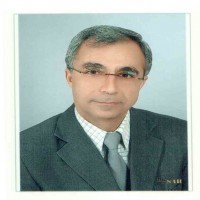
Assoc. Prof. Dr, Mardin Artuklu University, Kurdish Language and Culture Department
Editor-in-Chief

Assistant Editor

Ph.D, Mardin Artuklu University Kurdish Language and Culture Department
Editorial Board

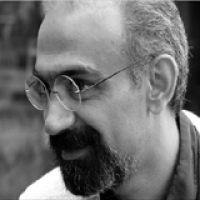
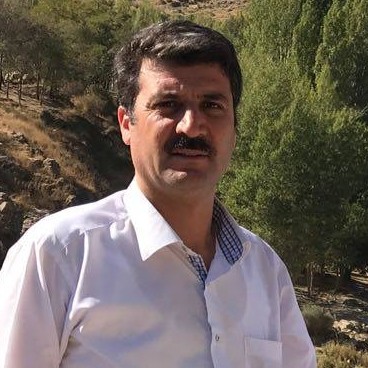
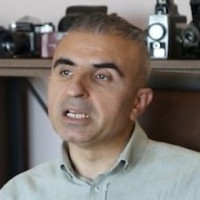


Alan Editörü (Dil ve Gramer)

Doç .Dr.
Field Editor (Classical Literature)

Assoc. Prof. Dr.
Field Editor (Modern Literature)

Dr.
Field Editor (Folklore)
Doç. Dr.
Field Editor (Cultural Studies)

Dr.
kurdish Language Editors (Kurmanji)
Dr.
Kurdish Language Editor (Sorani)
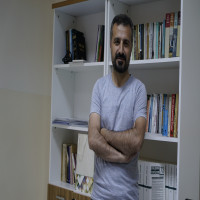
Assoc. Prof. Dr
Kurdish Language Editor (Zazaki)
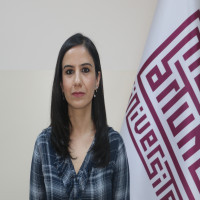
Dr.
English Language Editor

Turkish Language Editor

Book Review Editor
Etic Editor
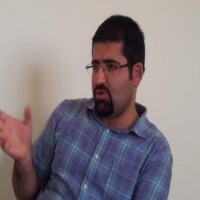
Doç. Dr.
Layout Editor

Araştırma Görevlisi
Indexing Editor

Ph.D, Mardin Artuklu University Kurdish Language and Culture Department
Webpage Editor

Social Media Editor

Araştırma Görevlisi
Advisory Board
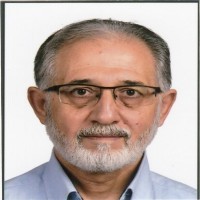
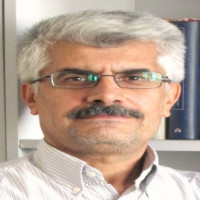
Faculty member at Mardin Artuklu University Kurdish Language and Literature department.
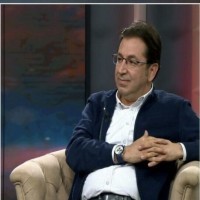
Prof. Dr.

The Journal of Mesopotamian Studies (JMS) is licensed through Attribution-NonCommercial 4.0 International.







